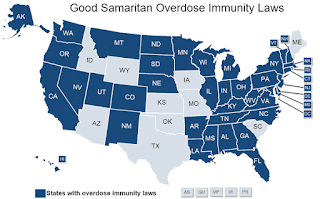- Unconscious and unable to be woken
- Awake but non-responsive
- Difficulty breathing
- Bluish lips and/or fingertips
- Pale, clammy skin
- Vomiting
- Delerium
- Limp body
- Seizures
Not all of these need to be present for a person to be overdosing. In general, if a person is under the influence and meets the first criteria (unconscious and unable to be woken) you can treat it as an overdose situation. If an intoxicated person falls unconscious and cannot be woken, it always qualifies an emergency.
What to do if someone is overdosing:
- If the person is unconscious but breathing, place them on their side in the recovery position. Make sure that the airway remains open by tilting the head back and lifting the chin. Make sure they are continuing to breathe.
- Do not try to make the person vomit.
- Do not give them anything to eat or drink, especially other drugs (nalaxone aside).
- Do not attempt CPR unless they are showing no signs of life. It is also inadvisable to attempt CPR if you do not have training.
- Do not attempt CPR unless they are showing no signs of life. It is also inadvisable to attempt CPR if you do not have training.
Seeking medical attention:
The Good Samaritan Law. This is a law which exists in these states:
The Good Samaritan Law exists to offer legal protection to people who give reasonable assistance to those who are, or who they believe to be, injured, ill, in peril, or otherwise in danger. When you call 911, State your location, state that there is a drug related emergency or overdose, and tell them exactly what drugs have been done if you know. If you call 911 and hang up they send police and fire as well as the ambulance. If paramedics know the situation upon arriving you won't be in legal trouble, though there is a chance they may confiscate any drugs in plain sight.
Even if your state/area doesn't have protections, calling an ambulance may still be a necessity. If you call an ambulance, bring any pill containers to the hospital so they can identify the drug taken.
Also, you can always call the Poisons Information Centre on 13 11 26 for advice on what to do to help for specific substances. It is completely confidential and can give you some peace of mind.
Overdose prevention:
Follow my guidelines for safe drug use. The more relevant of which for this topic are knowing your dosage, knowing how much can lead to an overdose, avoiding mixing substances, and not taking drugs which may not be what they are supposed to be.
If you are using opiates regularly, it is worth your time to find some nalaxone in your area (name brand Narcan). Read more about nalaxone HERE. Also, many prescription opiates have filers in them which can lead to overdose faster than the psychoactive ingredient in the medication. This can be avoided using a cold water extraction.

